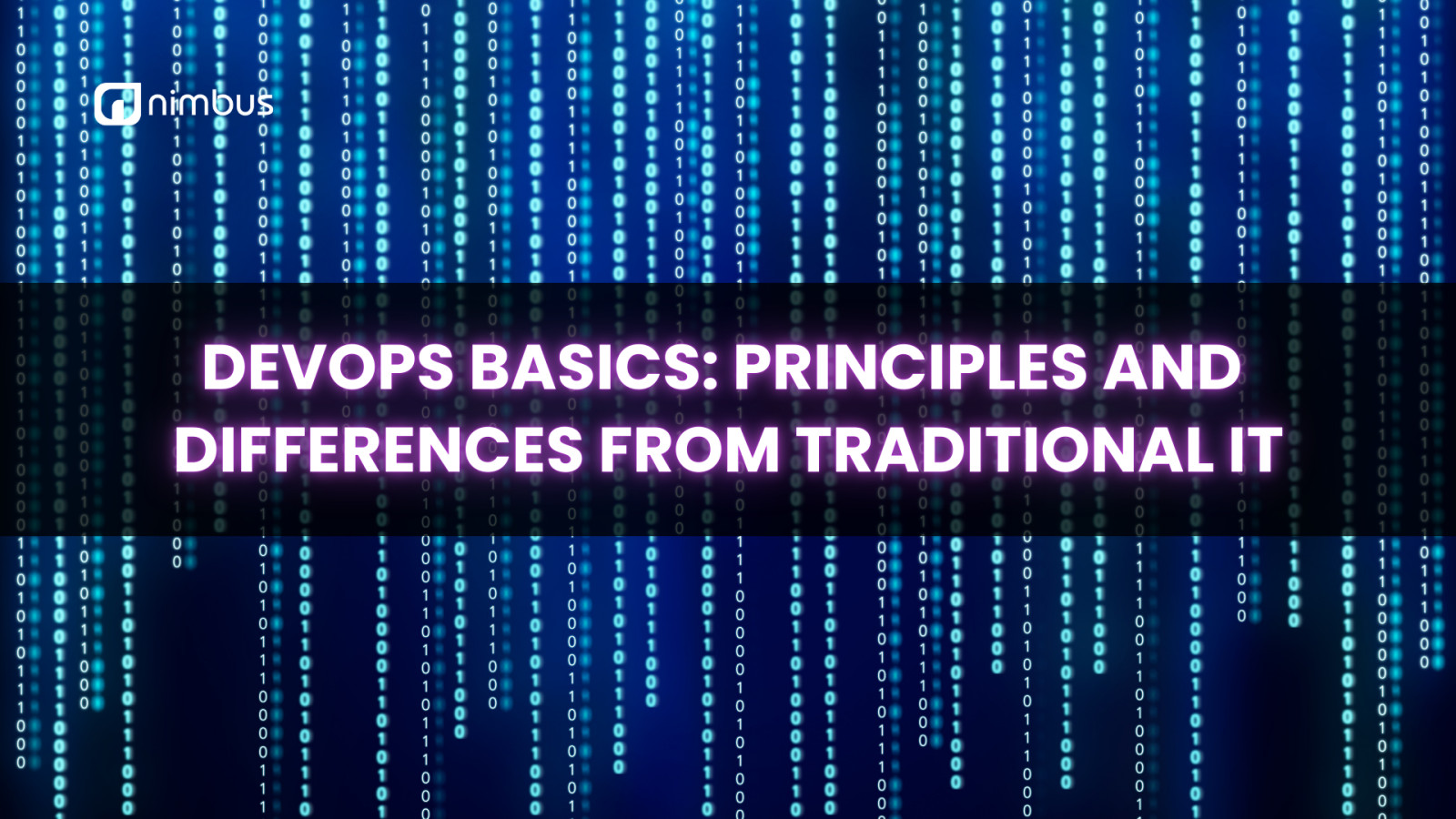One approach that has gained significant traction is DevOps, a methodology designed to bridge the gap between development and operations teams. This article delves into the fundamentals of DevOps, its core principles, and how it contrasts with traditional IT operations. Additionally, we'll explore how Nimbus, an IT staffing company, leverages these insights to enhance its services and provide superior solutions to clients.
What is DevOps?
DevOps is a cultural and technical movement that aims to improve collaboration between development (Dev) and operations (Ops) teams. By breaking down traditional silos and fostering a culture of continuous integration, continuous delivery, and continuous deployment, DevOps seeks to streamline the software development lifecycle. The ultimate goal is to accelerate the delivery of high-quality software while maintaining operational efficiency and stability.
Core Principles of DevOps
1. Collaboration and Communication: One of the central tenets of DevOps is enhancing collaboration between development and operations teams. In traditional IT operations, these teams often work in isolation, leading to inefficiencies and misunderstandings. DevOps encourages regular communication, shared goals, and joint problem-solving, which fosters a more cohesive and productive work environment.
2. Automation: DevOps emphasizes automating repetitive tasks to reduce manual errors and free up valuable time for more strategic work. This includes automating build processes, testing, deployment, and infrastructure management. Automation not only speeds up the software delivery process but also ensures consistency and reliability.
3. Continuous Integration and Continuous Deployment (CI/CD): CI/CD is a fundamental practice in DevOps that involves continuously integrating code changes into a shared repository and automatically deploying those changes to production. This approach allows teams to detect and address issues early, reduce deployment risks, and deliver updates to users more frequently.
4. Monitoring and Feedback: Continuous monitoring and feedback are crucial components of DevOps. By tracking application performance and gathering user feedback, teams can quickly identify issues, make data-driven decisions, and continuously improve their software products. This proactive approach helps maintain high-quality standards and enhances user satisfaction.
5. Infrastructure as Code (IaC): IaC is a practice where infrastructure is managed and provisioned through code rather than manual processes. This enables teams to automate the setup and management of their infrastructure, ensuring consistency and scalability. IaC also supports version control, making it easier to track changes and roll back if necessary.
Differences Between DevOps and Traditional IT Operations
1. Approach to Collaboration: Traditional IT operations oftenTraditional IT operations often involve separate development and operations teams working in isolation. This can lead to delays, miscommunications, and inefficiencies. DevOps, on the other hand, fosters a culture of collaboration, where teams work together towards common goals and share responsibilities throughout the software development lifecycle.
2. Speed and Agility: Traditional IT operations typically follow a waterfall model, where changes are made in distinct phases and delivered in long cycles. DevOps embraces an iterative approach with frequent, incremental updates, allowing organizations to respond more quickly to changing requirements and market demands.
3. Focus on Automation: In traditional IT operations, many processes are manual and prone to human error. DevOps places a strong emphasis on automation, reducing the need for manual intervention and ensuring consistent and reliable results. This shift towards automation leads to faster delivery, fewer errors, and more efficient use of resources.
4. Feedback and Improvement: Traditional IT operations may involve lengthy feedback loops, with limited visibility into the performance and user experience of applications. DevOps encourages continuous monitoring and feedback, enabling teams to gather real-time insights and make iterative improvements. This approach helps organizations maintain high-quality standards and address issues more proactively.
5. Infrastructure Management: Traditional IT operations often involve manual configuration and management of infrastructure, which can be time-consuming and error-prone. DevOps promotes the use of Infrastructure as Code (IaC), allowing teams to automate the provisioning and management of infrastructure through code. This leads to greater consistency, scalability, and easier management.
How Nimbus Leverages DevOps Insights
At Nimbus, we understand the transformative impact of DevOps on modern IT operations. Our IT staffing services are designed to help organizations adopt and implement DevOps practices effectively. By providing skilled DevOps professionals and leveraging our expertise, Nimbus supports clients in achieving their goals of faster delivery, higher quality, and greater operational efficiency.
1. Staffing DevOps Experts: Nimbus specializes in connecting organizations with top-tier DevOps professionals who possess the skills and experience needed to drive successful DevOps initiatives. Our talent pool includes experts in CI/CD, automation, monitoring, and Infrastructure as Code, ensuring that our clients have the right expertise to achieve their DevOps objectives.
2. Offshore Development Center (ODC): Our ODC services offer a flexible and cost-effective solution for organizations looking to build or scale their DevOps capabilities. By leveraging our offshore development centers, clients can access a dedicated team of DevOps professionals who work seamlessly with their internal teams to deliver high-quality software and infrastructure solutions.
3. Tailored Solutions: Nimbus understands that every organization has unique needs and challenges when it comes to DevOps. We work closely with our clients to provide customized staffing solutions that align with their specific requirements. Whether it’s supporting a DevOps transformation, scaling an existing team, or providing specialized expertise, Nimbus is committed to delivering value and driving success.
DevOps represents a fundamental shift in how organizations approach IT operations, focusing on collaboration, automation, continuous improvement, and efficient infrastructure management. By understanding the core principles of DevOps and recognizing its differences from traditional IT operations, organizations can make informed decisions about their IT strategies and practices.
At Nimbus, we are dedicated to helping organizations navigate the complexities of DevOps and achieve their objectives through our specialized staffing and ODC services. By leveraging our expertise and providing access to top talent, Nimbus supports clients in embracing DevOps principles and driving success in their digital transformation journey.
